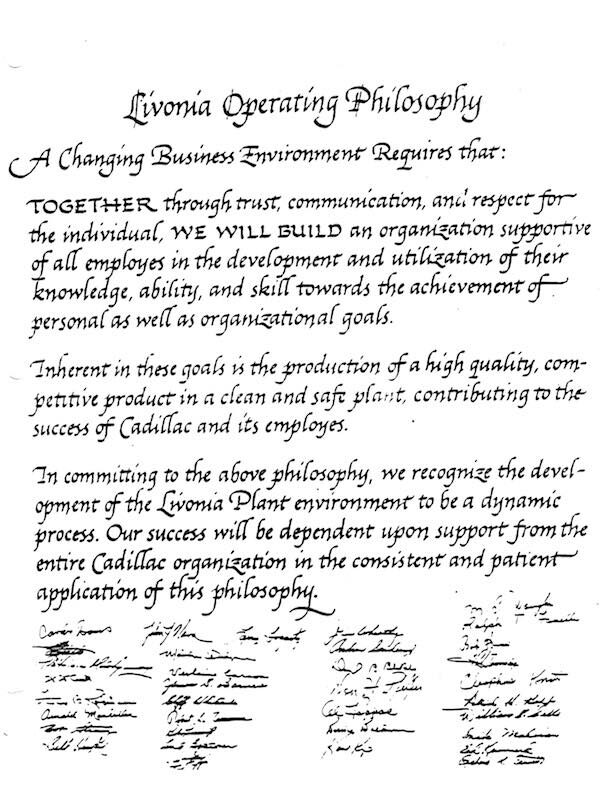Hear Mark read this post (subscribe to the podcast):
Earlier this month, I wrote about and shared my first blog post for the W. Edwards Deming Institute blog: “Why Dr. Deming's Work is So Important to Me“
Yesterday, they published the second in my series of three posts for them:
“The Failure of “The Livonia Philosophy” at my GM Plant“
Here's a picture of the plant, taken a few years ago after its closure (a victim of the GM bankruptcy, I guess):

I walked in those doors every morning… from June 1995 to June 1997.
My post for the Deming includes this excerpt:
“General Motors wasn't my ideal workplace… [but they] promised me a different type of workplace (one that existed, at least, at this plant), one based on the Deming philosophy. I was probably the only kid coming out of college who recognized or cared about that. But, it really mattered to me.
Sadly, it didn't take very long to realize that the plant had a very traditional management style, very traditionally combative labor/management relations, and a typical blame-and-shame, command-and-control environment that made people miserable and didn't deliver quality to the customer or any of the right business results.”
Why had the Livonia experiment failed? Read the whole post here or you can also find it below on this page.
What are lessons learned to think about for healthcare and Lean initiatives that have fallen by the wayside, like these two:
I hope you'll read the Deming Institute post. What do you think about these scenarios?
Coming soon, Part Three in the series:
Reflections on Dr. Deming's Hospital Notes – What Has Changed Since 1987?
Full Post:
As I wrote about in my first post, my first job out of college was at the GM Livonia Engine Plant, outside of Detroit. General Motors wasn't my ideal workplace after having read Deming's Out of the Crisis and learning a bit about Lean manufacturing in college. If possible, I wanted to work in something closer to the Deming environment. But, I needed a job, so I cast a wide net.
To my surprise, during the interviewing process, GM promised me a different type of workplace (one that existed, at least, at this plant), one based on the Deming philosophy. I was probably the only kid coming out of college who recognized or cared about that. But, it really mattered to me.
Sadly, it didn't take very long to realize that the plant had a very traditional management style, very traditionally combative labor/management relations, and a typical blame-and-shame, command-and-control environment that made people miserable and didn't deliver quality to the customer or any of the right business results.
What had happened? I was told that Dr. Deming had taught some workshops within GM, particularly the Powertrain division in the 1980s. A forward-thinking plant manager modified the Deming Philosophy to create something called “The Livonia Philosophy.”
But, after a period of success, that plant manager was promoted and the new plant manager, essentially hit the “undo” button on all of the Deming stuff. There were still posters in the hallway glass cases celebrating the new approach. But, it was no longer the daily reality in the plant. I've blogged about some of the problems and chaos on my blog before.
One of my colleagues gave me a copy of a “Livonia Philosophy” handbook that was gathering dust, and I've kept it to this day.

The first page says “The Livonia Operating Philosophy” is born from “a changing business environment requires that together through trust, communication, and respect for the individual, we will build an organization supportive of all employees in the development and utilization of their knowledge, ability, and skill towards the achievement of personal as well as organizational goals.”
Wow. That sounds very much like the Toyota Production System and Lean management. Toyota talks about “respect for people” or “respect for humanity” as an “equally important pillar” of their Toyota Way management philosophy (the other being “continuous improvement”). The Livonia plant didn't have a lot of trust and mutual respect. Without that, the communication mainly came in the form of yelling and screaming when results were poor.
Speaking of continuous improvement, my GM plant also had a very traditional “suggestion system,” not a Kaizen-style approach to improvement. It certainly wasn't a “culture of continuous improvement” and there wasn't any “quality culture” to speak of. People weren't working together toward personal and organizational goals… and that environment was, I'd say, management's fault.
The Livonia Philosophy (as written, not practiced) also sounds like Lean in the goal of utilizing all people's skill and creativity, as we practice in the Kaizen model. Toyota sometimes talks about the primary goal of improvement efforts to be learning and the development of people, with improved metrics being a secondary goal. What a progressive view that was back in the 80s. It's a shame it was long gone by 1995 (thanks for misleading me in the interviews, GM).
The document continues by saying, “Inherent in these goals is the production of a high quality, competitive product in a clean and safe plant, contributing to the success of Cadillac and its employees.”
We didn't have high quality – the data and many quality “spills” proved that. The plant wasn't clean – the floors were slippery with oil and grease (I slipped and fell once) and I still wonder if I harmed my health by breathing air that was full of coolant mist, something the union complained about constantly. Safety wasn't the primary focus – making the production numbers was more important, as I saw demonstrated in many ways.
The document continues, “In committing to the above philosophy, we recognize the development of the Livonia Plant environment to be a dynamic process. Our success will be dependent upon support from the entire Cadillac organization in the consistent and patient application of this philosophy.”
Instead of development, we got regression, apparently.
If this philosophy was really the right approach for the business, how could it slip away? How could GM install a new plant manager who was, apparently, so willing to undo that progress?
The same thing happens today in some healthcare organizations. As I blogged about previously, there was one hospital system that had been written up as a Lean success story in a major healthcare publication. Less than a year later, a new CEO came in from the outside and disbanded the internal Lean program. A similar thing happened with one of the hospitals I featured in the first edition of my book Lean Hospitals, when a new CEO came in and made it clear that Lean was no longer needed.
I guess it goes to show how difficult it is to change an organization's culture and how fragile that new culture can be. Have you lived through similar situations before? What can we do to prevent similar situations in the future?
Please scroll down (or click) to post a comment. Connect with me on LinkedIn.
If you’re working to build a culture where people feel safe to speak up, solve problems, and improve every day, I’d be glad to help. Let’s talk about how to strengthen Psychological Safety and Continuous Improvement in your organization.








